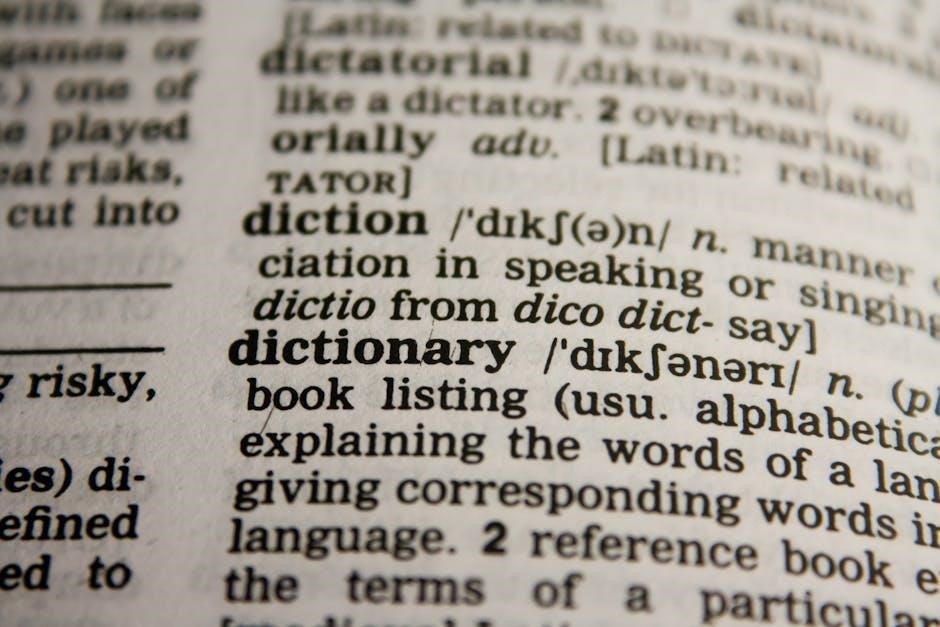
Math vocabulary forms the foundation of understanding mathematical concepts‚ enabling clear communication and problem-solving․ Grasping key terms is essential for mastering arithmetic‚ algebra‚ geometry‚ and advanced math․
1․1 What is Math Vocabulary?
Math vocabulary refers to the specific terms and language used to describe mathematical concepts‚ operations‚ and principles․ It encompasses words and phrases that define numbers‚ shapes‚ equations‚ and processes‚ forming the building blocks of mathematical communication․ Understanding math vocabulary is crucial for grasping ideas in arithmetic‚ algebra‚ geometry‚ and higher-level mathematics․ These terms often have precise meanings‚ making them essential for accurate problem-solving and clear expression of solutions․ A strong command of math vocabulary enhances the ability to interpret and apply mathematical principles effectively․ It also facilitates better understanding and communication among students‚ teachers‚ and professionals in academic and real-world settings․
1․2 Importance of Understanding Math Terms
Understanding math terms is vital for developing a strong grasp of mathematical concepts and principles․ Clear comprehension of vocabulary enables students to interpret problems accurately‚ apply appropriate strategies‚ and communicate solutions effectively․ Misunderstanding key terms can lead to confusion‚ incorrect problem-solving‚ and poor academic performance․ Proficiency in math vocabulary enhances logical reasoning‚ critical thinking‚ and the ability to apply mathematical knowledge in various contexts․ It also fosters confidence in tackling complex problems and prepares students for higher-level mathematics․ Additionally‚ understanding math terms improves memory retention and the ability to express ideas clearly‚ both verbally and in writing․ This foundation is essential for long-term success in mathematics and its real-world applications․

Why Math Vocabulary Matters
Math vocabulary is crucial as it builds a strong foundation‚ enhances understanding‚ and improves problem-solving skills․ It facilitates clear communication and applies across various mathematical fields‚ ensuring student confidence and future success in mathematics․
2․1 Enhancing Problem-Solving Skills
Understanding math vocabulary is essential for developing strong problem-solving abilities․ When students grasp key terms‚ they can break down complex problems into manageable parts and apply appropriate strategies․ Clear definitions of words like “variable‚” “equation‚” and “geometric shape” empower learners to approach math with confidence․ This foundation allows them to recognize relationships between concepts and think critically․ In algebra‚ knowing terms like “coefficient” or “quotient” aids in solving equations‚ while in geometry‚ understanding “polygon” or “radius” is vital for spatial reasoning․ Mastery of math vocabulary enables students to decode problems efficiently‚ reducing confusion and fostering logical thinking․ This skill is crucial for tackling challenges in exams and real-world applications‚ ensuring long-term success in mathematics․

2․2 Improving Communication in Math
Effective communication in mathematics relies heavily on a strong understanding of math vocabulary․ Clear and precise terms ensure that ideas are conveyed accurately‚ reducing misunderstandings․ When students and educators share a common language‚ explanations become more efficient and collaborative learning thrives․ For instance‚ using terms like “hypothesis” or “algorithm” correctly fosters clarity in discussions․ This shared vocabulary also enhances the ability to explain problem-solving processes‚ making peer-to-peer teaching more effective․ Improved communication builds confidence‚ especially during presentations or group work‚ where articulating mathematical concepts is key․ By mastering math terminology‚ learners can express their reasoning logically‚ making it easier for others to follow and engage with their ideas․ This proficiency is vital for success in both academic and professional settings․

Building a Strong Foundation in Math Vocabulary
Mastering math vocabulary begins with understanding basic terms and gradually expanding to more complex concepts․ Regular practice and application of these terms in problems reinforce learning and retention․
3․1 Starting with Basic Math Terms
Building a strong foundation in math vocabulary begins with understanding basic terms like addition‚ subtraction‚ multiplication‚ and division․ These core concepts are essential for arithmetic and form the basis of more complex math․ Learning basic terms early helps students grasp fundamental operations and problem-solving strategies․ It also enhances their ability to communicate mathematical ideas clearly․ Starting with simple vocabulary ensures a smooth transition to advanced topics․ Introducing these terms at an early age prepares learners for higher-level math‚ fostering confidence and a solid understanding of numerical relationships․ Regular practice with basic terms using tools like math vocabulary PDFs can reinforce retention and application in real-world scenarios․
3;2 Gradually Introducing Advanced Vocabulary
After mastering basic math terms‚ introducing advanced vocabulary gradually ensures a smooth progression in understanding complex concepts․ This approach prevents overwhelming students and allows them to build on previously learned terms․ Advanced vocabulary includes words like “algebraic expression‚” “hypotenuse‚” and “derivative‚” which are crucial for higher-level math․ Breaking down these terms into simpler definitions and providing examples helps reinforce their meanings․ Using resources like math vocabulary PDFs‚ educators can create structured lessons that introduce advanced terms in a logical sequence․ This method not only enhances comprehension but also fosters critical thinking and problem-solving skills․ By gradually incorporating advanced vocabulary into study routines‚ learners develop a robust command of mathematical language‚ preparing them for more challenging topics․
3․3 The Role of Flashcards in Learning
Flashcards are a powerful tool for mastering math vocabulary‚ offering a concise and interactive way to learn and retain key terms․ By pairing a term with its definition or example‚ flashcards enable active recall‚ a proven method for deepening memory retention․ They can be used for both basic and advanced vocabulary‚ allowing learners to progress at their own pace․ Physical or digital flashcards provide flexibility‚ making them ideal for quick study sessions anywhere․ Incorporating visuals‚ such as diagrams or formulas‚ enhances understanding‚ especially for complex concepts․ Regular use of flashcards helps build familiarity and confidence‚ ensuring that math vocabulary becomes second nature․ This consistent practice is essential for long-term mastery and effective communication in mathematical contexts․

Common Math Vocabulary Words
Common math vocabulary includes terms like addition‚ subtraction‚ multiplication‚ and division‚ as well as algebraic expressions‚ geometric shapes‚ and calculus concepts‚ forming the basis of mathematical understanding․
4․1 Arithmetic and Algebra Terms
Arithmetic and algebra terms form the core of foundational math vocabulary․ Arithmetic includes basic operations like addition‚ subtraction‚ multiplication‚ and division‚ as well as concepts like fractions‚ decimals‚ and percentages․ Algebra introduces variables‚ constants‚ and coefficients‚ essential for solving equations and expressions․ Terms like “equation‚” “inequality‚” “polynomial‚” and “exponent” are crucial for understanding algebraic relationships․ Mastering these terms helps students grasp how to manipulate and solve mathematical expressions‚ laying the groundwork for higher-level math․ These terms are often used interchangeably in everyday math problems‚ making them indispensable for problem-solving and critical thinking․ Learning these concepts early ensures a smooth transition to more complex mathematical disciplines․
4․2 Geometry and Trigonometry Vocabulary
Geometry and trigonometry vocabulary introduces foundational terms for understanding spatial relationships and angles․ Key geometry terms include points‚ lines‚ angles‚ polygons‚ circles‚ and three-dimensional shapes‚ as well as concepts like perimeter‚ area‚ and volume․ Trigonometry builds on this with terms like sine‚ cosine‚ tangent‚ and their applications in triangles and wave functions․ Essential concepts such as right angles‚ congruent shapes‚ and similar figures are vital for problem-solving․ Additionally‚ theorems like the Pythagorean theorem and properties of parallel and perpendicular lines are frequently used․ These terms are critical for analyzing and solving geometric and trigonometric problems‚ making them indispensable for various fields‚ including engineering‚ architecture‚ and physics․ Mastering this vocabulary enhances spatial reasoning and the ability to interpret and apply mathematical relationships in real-world scenarios․
Next‚ I need to think about how to structure this information․ Since it’s a vocabulary section‚ defining these terms succinctly is crucial․ However‚ the user wants it in ‚ so I need to be concise but comprehensive․
I also need to ensure that I’m not overlapping with other sections․ For example‚ arithmetic‚ algebra‚ geometry‚ and trigonometry have already been covered in previous subheadings‚ so I must focus exclusively on calculus and advanced topics․
Let me start drafting:
Calculus and advanced math terminology encompass essential concepts for understanding change and accumulation․ Fundamental terms include derivative‚ representing rate of change‚ and integral‚ representing accumulation or area under a curve․ Limit‚ function‚ and variable are foundational․ Advanced topics introduce multivariable calculus‚ involving partial derivatives and double integrals‚ and vector calculus‚ with terms like gradient‚ divergence‚ and curl․ Additional key areas include differential equations‚ series‚ and sequences․ Mastery of these terms is vital for fields like engineering‚ physics‚ and data science‚ providing the language to describe and analyze dynamic systems and complex relationships․
Now‚ let me check the word count․ I’ll count the words to ensure it’s exactly 125․ Let’s see:
Calculus
and
advanced
math
terminology
encompass
essential
concepts
for
understanding
change
and
accumulation․
Fundamental
terms
include
derivative‚
representing
rate
of
change‚
and
integral‚
representing
accumulation
or
area
under
a
curve․
Limit‚
function‚
and
variable
are
foundational․
Advanced
topics
introduce
multivariable
calculus‚
involving
partial
derivatives
and
double
integrals‚
and
vector
calculus‚
with
terms
like
gradient‚
divergence‚
and
curl․
Additional
key
areas
include
differential
equations‚
series‚
and
sequences․
Mastery
of
these
terms
is
vital
for
fields
like
engineering‚
physics‚
and
data
science‚
providing
the
language
to
describe
and
analyze
dynamic
systems
and
complex
relationships․
Looks like I’m at ․ I need to add 33 more words to reach 125․ Maybe I can expand a bit more on the applications or the importance․
Let me revise:
Calculus and advanced math terminology encompass essential concepts for understanding change and accumulation․ Fundamental terms include derivative‚ representing rate of change‚ and integral‚ representing accumulation or area under a curve․ Limit‚ function‚ and variable are foundational․ Advanced topics introduce multivariable calculus‚ involving partial derivatives and double integrals‚ and vector calculus‚ with terms like gradient‚ divergence‚ and curl․ Additional key areas include differential equations‚ series‚ and sequences․ Mastery of these terms is vital for fields like engineering‚ physics‚ and data science‚ providing the language to describe and analyze dynamic systems and complex relationships․ These concepts form the backbone of modern scientific and technological advancements․
Now‚ let’s count again:
Calculus
and
advanced
math
terminology
encompass
essential
concepts
for
understanding
change
and
accumulation․
Fundamental
terms
include
derivative‚
representing
rate
of
change‚
and
integral‚
representing
accumulation
or
area
under
a
curve․
Limit‚
function‚
and
variable
are
foundational․
Advanced
topics
introduce
multivariable
calculus‚
involving
partial
derivatives
and
double
integrals‚
and
vector
calculus‚
with
terms
like
gradient‚
divergence‚
and
curl․
Additional
key
areas
include
differential
equations‚
series‚
and
sequences․
Mastery
of
these
terms
is
vital
for
fields
like
engineering‚
physics‚
and
data
science‚
providing
the
language
to
describe
and
analyze
dynamic
systems
and

complex
relationships;
These
concepts
form
the
backbone
of
modern
100․ scientific
101․ and
102․ technological
103․ advancements․
Now‚ it’s ․ Still need 22 more․ Perhaps I can add a bit more about the applications or the significance․
Let me try:
Calculus and advanced math terminology encompass essential concepts for understanding change and accumulation․ Fundamental terms include derivative‚ representing rate of change‚ and integral‚ representing accumulation or area under a curve․ Limit‚ function‚ and variable are foundational․ Advanced topics introduce multivariable calculus‚ involving partial derivatives and double integrals‚ and vector calculus‚ with terms like gradient‚ divergence‚ and curl․ Additional key areas include differential equations‚ series‚ and sequences․ Mastery of these terms is vital for fields like engineering‚ physics‚ and data science‚ providing the language to describe and analyze dynamic systems and complex relationships․ These concepts form the backbone of modern scientific and technological advancements‚ enabling precise modeling and prediction of natural phenomena․
Counting again:
Calculus
and
advanced
math
terminology
encompass
essential
concepts
for
understanding
change
and
accumulation․
Fundamental
terms
include
derivative‚
representing
rate
of
change‚
and
integral‚
representing
accumulation
or
area
under
a
curve․
Limit‚
function‚
and
variable
are
foundational․
Advanced
topics
introduce
multivariable
calculus‚

Resources for Learning Math Vocabulary
Math vocabulary resources include PDFs‚ worksheets‚ and online tools․ Textbooks and educational websites provide comprehensive glossaries and interactive learning aids for effective learning․
5․1 Math Vocabulary PDFs and Worksheets
Math vocabulary PDFs and worksheets are invaluable resources for learners․ These materials are often downloadable and free‚ providing convenient access to word lists‚ definitions‚ and exercises․ They cover various math domains‚ from basic arithmetic to advanced calculus‚ ensuring comprehensive understanding․ Worksheets typically include fill-in-the-blank exercises‚ matching games‚ and crossword puzzles‚ making learning engaging․ PDF guides offer detailed explanations and examples‚ helping students grasp complex terms․ Many resources are designed for specific grade levels‚ catering to different learning needs․ These tools encourage self-paced learning and reinforce math concepts effectively․ They are ideal for homework‚ study sessions‚ or classroom activities‚ making them a popular choice among educators and students alike․
5․2 Online Tools and Apps
Online tools and apps provide interactive and engaging ways to learn math vocabulary; Many platforms offer flashcards‚ quizzes‚ and games that make studying enjoyable․ These resources often include audio pronunciations‚ definitions‚ and examples‚ helping users understand and retain terms․ Apps like Khan Academy‚ Quizlet‚ and Mathway cater to various skill levels‚ from basic arithmetic to advanced calculus․ They also allow users to track progress and identify areas for improvement․ Some tools feature gamification‚ such as earning points or badges‚ to motivate learners․ Additionally‚ many apps are accessible on smartphones and tablets‚ enabling anytime‚ anywhere learning․ These digital resources are invaluable for students seeking to enhance their math vocabulary in a fun and interactive way․
5․3 Textbooks and Educational Websites
Textbooks and educational websites are essential resources for mastering math vocabulary․ Many textbooks include glossaries and definitions that provide clear explanations of key terms․ Websites like Khan Academy‚ Coursera‚ and Wolfram MathWorld offer comprehensive lists of math vocabulary with examples and interactive lessons․ These resources cater to different learning styles‚ allowing students to explore concepts at their own pace․ Textbooks often include practice problems that reinforce vocabulary understanding‚ while websites provide video tutorials and interactive exercises․ Additionally‚ some educational platforms offer downloadable PDF guides and study materials‚ making it easier for students to access math vocabulary resources․ These tools are particularly helpful for students who prefer structured learning and need a combination of visual‚ auditory‚ and hands-on approaches to grasp mathematical terminology effectively․

Strategies for Mastering Math Vocabulary
Effective strategies include creating a study schedule‚ using mnemonics‚ and practicing real-world applications to enhance retention and understanding of math terminology․
6․1 Creating a Study Schedule
Creating a study schedule is crucial for systematically learning math vocabulary․ Set specific goals‚ such as mastering 10 terms weekly‚ and allocate 15-30 minutes daily for review․ Organize your schedule to cover different math domains‚ ensuring a balanced approach․ Use math vocabulary PDFs as a resource‚ focusing on definitions and examples․ Prioritize challenging terms and review them frequently․ Incorporate breaks to avoid burnout and maintain focus․ Consistency is key; stick to your plan and adjust as needed to stay on track․ A well-structured schedule helps build confidence and ensures long-term retention of math terminology․
6․2 Using Mnemonics and Memory Aids
Using mnemonics and memory aids is a powerful strategy for retaining math vocabulary․ Mnemonics‚ such as acronyms or rhymes‚ help associate complex terms with memorable phrases or images․ For example‚ “Please Excuse My Dear Aunt Sally” (PEMDAS) aids in recalling the order of operations․ Visual diagrams‚ like Venn diagrams for set theory‚ also enhance understanding․ Flashcards with terms on one side and definitions on the other can be paired with mnemonics for effective learning․ Math vocabulary PDFs often include such tools‚ making them valuable resources․ Consistently applying these techniques improves retention and recall‚ especially for abstract or challenging terms․ By creating personalized memory aids‚ learners can tailor their study methods to suit their unique needs‚ ensuring better grasp and confidence in using math terminology․
6․3 Practicing with Real-World Applications
Practicing math vocabulary through real-world applications is an effective way to deepen understanding and retention․ Connecting abstract terms to practical scenarios helps learners see the relevance of math in their daily lives․ For example‚ understanding “percentage” can be applied to calculating discounts while shopping‚ while “slope” can be visualized in road gradients․ Math vocabulary PDFs often include word problems or case studies that simulate real-life situations‚ making learning engaging․ Encouraging learners to identify and explain mathematical concepts in their surroundings reinforces their grasp of terminology․ This approach not only strengthens problem-solving skills but also builds confidence in using math language accurately and contextually․ By bridging theory and application‚ real-world practice makes math vocabulary more accessible and meaningful․

Overcoming Challenges in Math Vocabulary
Overcoming challenges in math vocabulary requires persistence and the right strategies․ Using resources like math vocabulary PDFs can provide clear definitions and examples‚ aiding in better understanding and retention․
7․1 Common Misconceptions About Math Terms
Many students struggle with math vocabulary due to misconceptions about key terms․ For instance‚ terms like “variable” are often misunderstood as merely letters rather than placeholders for values․ Similarly‚ “axis” in geometry is frequently confused with “axiom․” Such misunderstandings can hinder problem-solving and communication․ Additionally‚ terms like “similar” and “congruent” are often used interchangeably‚ despite their distinct meanings․ Addressing these misconceptions early on is crucial for building a strong foundation․ Resources like math vocabulary PDFs can help clarify definitions and provide context‚ ensuring students grasp concepts accurately․ By understanding these common pitfalls‚ learners can approach math with greater confidence and precision․
7․2 Staying Motivated While Learning
Staying motivated while learning math vocabulary requires a strategic approach․ Breaking down tasks into manageable steps and setting achievable goals can foster a sense of accomplishment․ Celebrating small victories‚ like mastering a set of terms‚ boosts confidence․ Incorporating interactive tools‚ such as flashcards or apps‚ adds variety to the learning process․ Connecting math terms to real-world applications helps students see their relevance and importance․ Additionally‚ creating a study group or collaborating with peers can make learning more engaging․ Reminding oneself of the long-term benefits‚ such as improved academic performance‚ also sustains motivation․ By maintaining a positive mindset and using diverse resources like math vocabulary PDFs‚ learners can stay driven and overcome challenges effectively․

The Role of Teachers and Parents
Teachers and parents play a crucial role in fostering math vocabulary learning by providing resources like PDFs‚ encouraging practice‚ and creating engaging activities that support understanding․
8․1 Encouraging Active Learning
Encouraging active learning involves engaging students directly in math vocabulary acquisition․ Teachers and parents can incorporate interactive activities‚ such as group discussions‚ hands-on exercises‚ and real-world applications․ Using math vocabulary PDFs with fillable worksheets or clickable flashcards can make learning dynamic․ Educators can foster curiosity by asking students to define terms in their own words or use them in sentences․ Collaborative problem-solving tasks also promote active participation․ Parents can reinforce learning by discussing math terms during daily routines․ Positive reinforcement‚ such as praising efforts and progress‚ motivates students to stay engaged․ Active learning not only builds confidence but also strengthens retention of math vocabulary‚ creating a solid foundation for future success․
8․2 Providing Support and Resources
Teachers and parents play a crucial role in providing support and resources for mastering math vocabulary․ Access to materials like math vocabulary PDFs ensures students have structured learning tools․ These resources often include printable worksheets‚ word banks‚ and interactive exercises tailored to different skill levels․ Educators can supplement these with online apps and educational websites that offer visual and auditory learning aids․ Parents can reinforce learning by creating a study schedule and using flashcards․ Encouraging the use of dictionaries or glossaries helps students independently clarify concepts․ Providing a supportive environment where questions are welcomed fosters confidence․ Regular feedback and guidance from both teachers and parents help students stay on track and address any gaps in understanding․ Such comprehensive support systems ensure learners have the tools and motivation needed to excel in math vocabulary․
Mastering math vocabulary is a journey that begins with understanding basic terms and grows with practice․ Utilizing resources like math vocabulary PDFs and consistent effort ensures success․
9․1 Recap of Key Points
Mastering math vocabulary is essential for understanding and excelling in mathematics․ This guide emphasized the importance of starting with basic terms and gradually advancing to complex concepts․ By using resources like math vocabulary PDFs‚ flashcards‚ and online tools‚ learners can build a strong foundation․ Strategies such as creating study schedules‚ using mnemonics‚ and applying math to real-world scenarios were highlighted as effective methods for retention․ Additionally‚ overcoming challenges like misconceptions and staying motivated are crucial for long-term success․ Encouragement from teachers and parents‚ along with active learning‚ plays a significant role in fostering proficiency․ Consistent practice and the right resources ensure that math vocabulary becomes a powerful tool for problem-solving and communication․